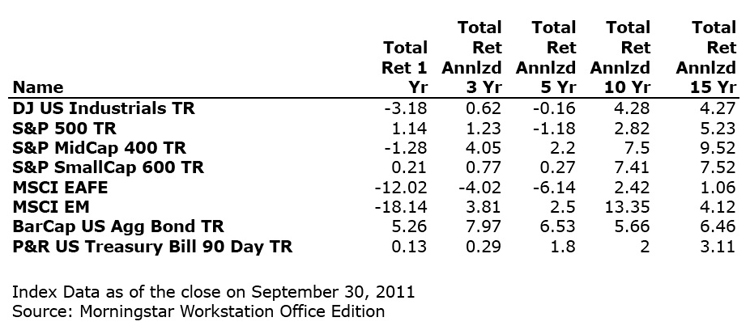The markets fell, for the most part, during the third quarter continuing the challenge for many people to remain invested. Some investors moved out of the market already and will eventually have to decide when to invest again. That is the challenge for short-term investors and for those who attempt to time the market. The advantage of long term investing is the stress and strain of rapidly fluctuating markets is something you can ignore.
Here are a few important questions you should consider.
First, do you have adequate savings and emergency funds? (At least 6 months of your net take home pay)
Second, if you have debt, are you paying the debt off and will it be paid off completely within the next few years?
Finally, are your investments in the stock markets long-term (at least ten years)?
If your answers to these questions are all “Yes”, there is no reason to abandon the markets! There have only been a few ten year periods, in the US, when the market had a negative return. To my knowledge, there has never been a negative return over periods of 15 years or more. Negative return means getting back less than you invested or losing money.
If you’re investing in a 401k or other retirement plan and you are more than ten years from retirement, you should remain invested primarily in stocks. Even if you are retired, assuming all of your answers to the three questions above is “Yes”, you should also continue to invest in stocks. My recommendation is to invest using mutual or exchange traded funds as opposed to individual stocks.
Regardless of what you might hear or see from analysts and commentators, there is no crystal ball. Nobody consistently predicts future returns accurately. Buying high and selling low is extremely difficult, even for professionals. As an example, would you feel comfortable selling gold today and investing the proceeds in a market that is currently falling?
Most people have a great deal of difficulty selling great investments and even more difficulty buying when prices are low. The natural tendency is to wait for good news but by then the prices are generally already much higher.
It may seem completely irrational, but you should keep your long-term investments in the volatile, sometimes crazy, markets. Over the long term, those who have the courage to remain invested outperform those who try to invest only when market forecasts look positive.
Focus on your life, not your money. You will have more fun and end up with a higher return!

Great post, Mr. Puckett. Thumbs up.
Thanks Petunia! I generally post a market review with long term index returns in the week following the end of each month. Glad you enjoyed it!
I needed to hear this today. Every time I check the retirement account, I’ve lost thousands more. I work so hard to save that It hurts to think of it!
Jenn,
I’m glad it was helpful. When investing for retirement it is very easy to get caught up in the short term craziness of all markets. Investing for retirement is like sailing across an ocean. If you focused on every wave as your ship crossed the sea, you would not only get seasick but you’d probably drive yourself crazy. Ignore the storms and the waves and keep saving. Retirement accounts won’t be needed until you get to your destination. Keep contributing and look for a post soon about the benefits of falling markets when it comes to retirement investing! Buying low is good!
I love this analogy Paul!
Paul the point you raised about debt is important. Large amounts of unsecured debt (and even some of the secured variety) are the equivalent of a margin loan on a stock portfolio. If stocks are falling, those debts just seem to get bigger. That might have something to do with why people panic in falling markets.
Another might be that people load up on hot stocks–the ones everyone else is buying on the way up. A lot of them are poor performers on the way down, and that’s even scarier. It would be less stressful if an investor concentrated on dividend paying stocks, value stocks and strategic stocks (industries we can’t live without). If most of your money is sitting in one of those stock types, the ride won’t be as bumpy.